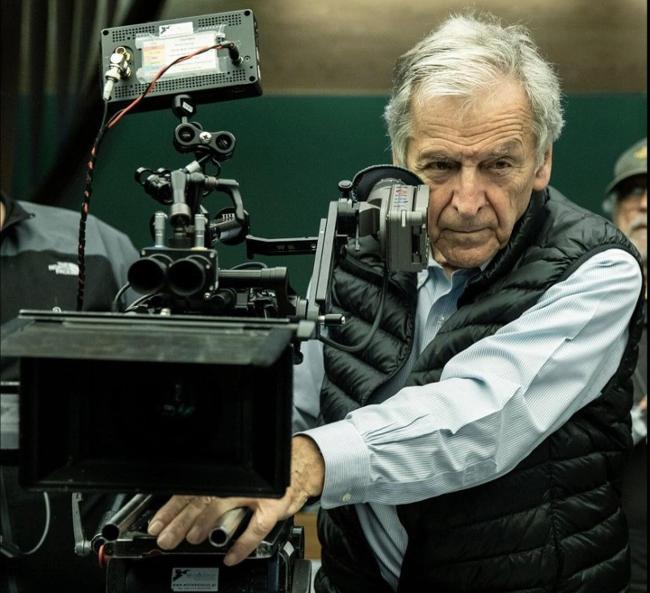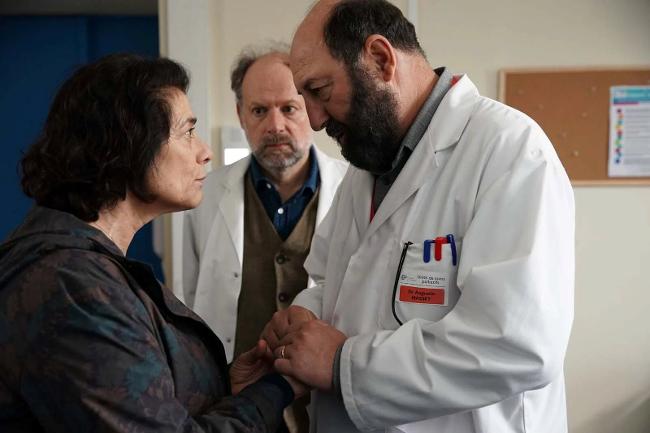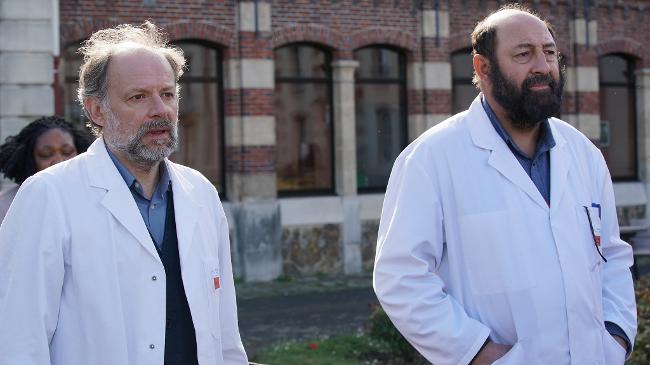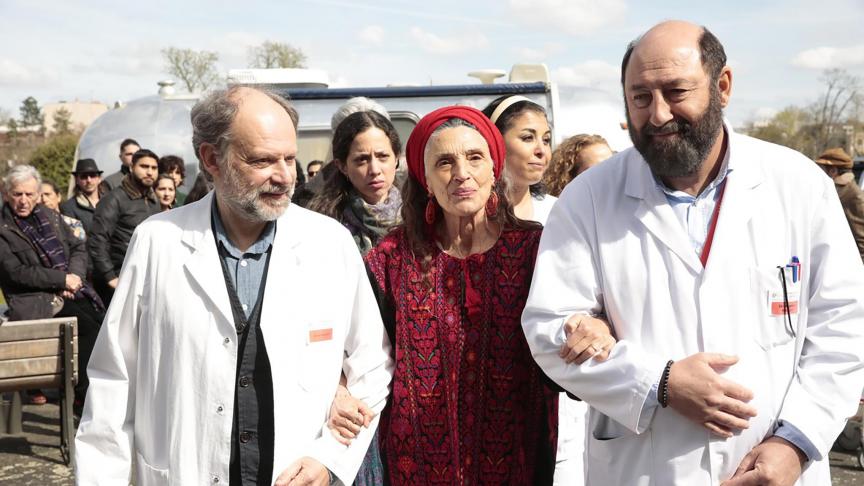6-3-25
Costa-Gavras Walks Tall at the LAGFF
By Diane Sippl

After all, the end of life is still life.
Costa-Gavras
Dapper in his summer-white pants, and with a warm smile, he stepped onto the stage looking fit and lithe (after all, he was once a ballet dancer and has since directed ballet and opera productions). The 92-year-old maestro of cinema, born in Greece and knighted in France where he has lived since turning 22, waited for his standing ovation to cease before he could speak. Some remarked about his red socks, a trademark, it seems, at his several in-person appearances at the 19thLos Angeles Greek Film Festival from May 27-June 1, 2025. His name, Konstantinos “Kostas” Gavras, became Costa-Gavras after his exile to Paris. He was elected as President of the Cinémathèque Française in 2007 and serves it to this day, having made more than 20 feature films with credits as a director, writer, and producer (along with Michèle Ray Gavras, his wife for nearly 60 years).
In its multi-event tribute to Costa-Gavras, The Los Angeles Greek Film Festival (LAGFF) screened four of his renowned films during the week: for its Opening Night at the historic Egyptian Theater in Hollywood, his 1969 masterpiece Z,which won Oscars for Best Foreign Language Film and Best Editing as well as the Jury Prize and Best Interpretation award for Jean-Louis Trintignant at the Cannes Film Festival; for a centerpiece screening with extended discussion at UCLA’s James Bridges Auditorium, his freshly-finished feature The Last Breath (2024); and for a post-festival screening co-sponsored by the American Cinematheque at the Egyptian, the Cannes Palme d’Or winner and the Oscar winner for Best Adapted Screenplay, Missing (1982) along with The Confession (1970), another true-story political thriller. Spanning the globe from Greece in 1963’s military conspiratorial group, to Czechoslovakia in 1968’s “show trials” by the Russian regime, to Chile in 1973’s U.S. government-backed coup d'état, to France today, Costa-Gavras has ever been a cineaste of his times, depicting and provoking thought on political upheavals and denouncing social injustices, often right in the midst of them.

His films typically grip the viewer with chilling suspense, with a fast-moving camera and lightning editing, and in the case of Z, rapid-fire dialogue and spell-binding narrative detail. They share and shed light on true events often ignored by much of the world but nonetheless exacting huge tolls on massive populations. They pinpoint the culprits, they piercingly and relentlessly assign blame, and they paint a picture of an era direly in need of improvement.
Costa Gavras’ most recent film, The Last Breath, released in France a few months ago, departs in some ways from this general approach to the art of cinema. It shares with his earlier works a huge ensemble of characters, a key public issue, and a universal theme with a focus on an individual suffering the consequences, someone simple and admirable with whom we can identify, empathize, and take a lesson. But, as the filmmaker warns his audience in his talks, “My films are not there to teach. Cinema is spectacle.” We’re moved by sight and sound, by what we sense on the screen, and as with all his works, The Last Breath offers us scenes pulling emotional impact from us not because they are shocking but because of the way Costa-Gavras fills his screen—in the case of this film, with longer takes of the usual wide shots, encouraging our full perspective, but also allowing us time to drink in and contemplate the details.
The cast, given its size, is mostly real-life professionals playing their normal work roles in hospitals or in a service referred to as “palliative care,” referring to the quality—comfort and peace—of end-of-life days. We do, however, come across some of today’s best actors. Look at the list of women: Charlotte Rampling, Françoise Lebrun, and Ángela Molina—grandes dames of the world’s cinema screens—all play elderly women seeking palliative care, each somewhat differently, and the younger Agathe Bonitzer rebels against the fact that she has been delivered at the center rather than to her chemo-therapist. Hiam Abbas struggles to face her husband’s illness, and he, to hide it from her, until she is able to give him “permission to leave.” Marilyne Canto is exquisite as the productive and confident wife of a possibly ill writer, as is Karin Viard as the wisely self-possessed doctor who has something physical to show him. It is, arguably, a “woman’s film,” but no old-fashioned “woman’s weepie” from Hollywood movie days. These strong characters—and actors—hold their own.

Yet at the center are two men, derived from co-authors Doctor Claude Grange and philosopher Regis Debray and theiressay-style book reporting a vast number of cases of end-of-life care. Reading it inspired Costa-Gavras to join them in bringing the topic to the public dialogue, so he selected a (large) handful of the cases to present in a film through dramatization. Denis Podalydès, not only an actor but himself a scriptwriter and theatre director of Greek descent, turns in an extremely sensitive and compelling performance as the philosophical writer Fabrice Toussaint, and Kad Merad plays a doctor of palliative care, Augustin Masset, who invites the writer to shadow him on his rounds at the beautiful countryside center where he can see for himself how the salient issues arise, the better to enrich his next book, which will be made into a TV show. True to his typical path in filmmaking, Costa Gavras cast Merad, usually a comedian, as the opposite (for further interest and challenge), as a serious and empathetic figure who could inspire the existential journey of the lead character, Toussaint, whom we discover may be concerned about his own diagnosed lesion as potential cancer.
The storytelling is quite episodic, and what there is of a linear narrative, a central character, was largely created by Costa-Gavras to give us a protagonist but not a clear ending—that is, not the “death scene” we might expect based on our film-viewing experience, but a “life scene” opening a window for us to look, think, and ask: “Shouldn’t there be more?” Not the days left to live, but the experience of them, and the choices we could make. “Couldn’t it all be better?” The filmmaker conducted substantial research and observation of palliative care and found it to be wonderful, because the patient is not left alone but receives special guidance in the last, valuable days of life, yet Costa-Gavras laments that not everyone who needs this care can access it. “They have it in Switzerland. In France,” he said, “there are two or three thousand beds for palliative care and there should be 200,000.”

So many questions—about medical ethics, religious beliefs, economic resources, family relations—come to play in the vignettes we follow as our doctor and philosopher make their rounds. One question I will never forget came up in the post-screening discussion at UCLA. Oliver Stone, forever pushing Costa-Gavras’ buttons with his own myopic, tone-deaf, self-aggrandizing comments after he himself hobbled to the stage, opened the Q&A with the tasteless American-Barbara-Walters-style journalist’s question: “So tell me, Costa—is this your last film?”
“This is my new film,” remarked the ever gracious and eloquent bard. And he’s already working on another.
As he made his way through the crowd to exit the post-screening reception, people applauded when he walked by—much as the characters did in his film, whether in a motor-bike processional or a Romany homage beside a caravan, with music, song, and dance as Ángela Molina waved good-bye to them. Walking by us Saturday night was a living legend of world cinema.
The Last Breath
Director, screenplay, editing: Costa-Gavras; Producers: Michele Ray Gavras, Alexandre Gavras; Cinematography: Nathalie Durand, Olivier Rostan; Music: Armand Amar; Sound: Julien Sicart Tan Ham, Claire Berriet, Caroline Reynaud, Daniel Sobrino.
Cast: Denis Podalydès, Kad Merad, Marilyne Canto, Angela Molina, Charlotte Rampling, Hiam Abbass, Karin Viard, Agathe Bonitzer.
100 minutes, color, in French with English subtitles.